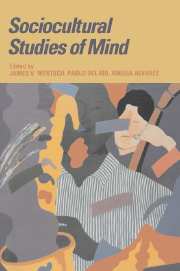Book contents
- Frontmatter
- Contents
- Series Foreword
- List of contributors
- Sociocultural studies: history, action, and mediation
- Part I Human action: historical and theoretical foundations
- Part II Mediation in action
- Part III Sociocultural setting, intersubjectivity, and the formation of the individual
- Part IV Sociocultural settings: design and intervention
- 8 Socio-cultural-historical psychology: some general remarks and a proposal for a new kind of culturalgenetic methodology
- 9 Tossing, praying, and thinking: the changing architectures of mind and agency
- Index
8 - Socio-cultural-historical psychology: some general remarks and a proposal for a new kind of culturalgenetic methodology
Published online by Cambridge University Press: 05 June 2012
- Frontmatter
- Contents
- Series Foreword
- List of contributors
- Sociocultural studies: history, action, and mediation
- Part I Human action: historical and theoretical foundations
- Part II Mediation in action
- Part III Sociocultural setting, intersubjectivity, and the formation of the individual
- Part IV Sociocultural settings: design and intervention
- 8 Socio-cultural-historical psychology: some general remarks and a proposal for a new kind of culturalgenetic methodology
- 9 Tossing, praying, and thinking: the changing architectures of mind and agency
- Index
Summary
Preliminary remarks
Before focusing on the main theme of this chapter, I feel it necessary to say a few words about the current circumstances confronting psychologists who take the social and cultural foundations of human nature as the starting point for their analyses. While such approaches to psychology remain distinctly minority viewpoints within our discipline, it is my impression that they are receiving more attention than at any time since the 1920s and certainly in my professional lifetime. This situation offers pleasant prospects of increased support and recognition. But it also poses dangers: Nowhere are these ideas so highly developed that it is possible to refer to them as a mature scientific paradigm with generally accepted theoretical foundations, a methodology, and a well-delineated set of prescriptions for relating theory to practice. It is my hope that the first meeting of the Society for Sociocultural Research will further the goal of formulating an ecumenical and broadly useful approach to the inclusion of culture and the social world in our theories and practices.
Assuming I am correct about the increasing popularity of the ideas discussed herein, it is possible to identify many causes for this interest: Disenchantment with positivist social sciences more generally, the erosion of support for Piagetian theory among developmentalists, skepticism about the terms in which the study of artificial intelligence is being pursued, despair at the fractionation of psychology, and the search for viable alternatives to various kinds of social learning theory would be some of my candidate factors, but many others could be offered.
- Type
- Chapter
- Information
- Sociocultural Studies of Mind , pp. 187 - 214Publisher: Cambridge University PressPrint publication year: 1995
- 62
- Cited by



